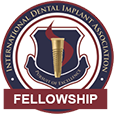Dental Implants
Why Choose Dr. Steven Decasperis?
- 30 + Years Experience in Implant Placement and Restoration
- Has achieved Fellowship, Mastership, and Diplomate Status in the International Dental Implant Association
- Because All procedures are performed in the office, we can usually provide the procedures at a significant cost savings for our patients
- Dr. DeCasperis was voted by his peers as a Top Choice Dentist in NJ Monthly Magazine for 2015, 2016, 2017, 2018, and 2019.
- Lectured at the Residency program of Robert Wood Johnson Medical School
You’ve lost a tooth, or perhaps several. Chewing is difficult and smiling, well it’s too embarrassing. There is no question that the quality of your life has changed. Dental implants are the solution to renewing your smile, your chewing ability and quite frankly your quality of life.
Reasons to Consider Dental Implants
- Without the root structure of a natural tooth the jawbone can shrink making your face look older.
- There are no loose parts. An implant is stable and comfortable.
- Normally, it will serve its owner for life.
- Dental Implants LOOK and FEEL like natural teeth.
- Dental implants help you eat, chew, smile, talk and look completely natural. This functionality imparts social, psychological and physical well-being.
When both the tooth and root are damaged, the best permanent replacement is a dental implant in conjunction with a ceramic crown.
What is a Dental Implant?
- A dental implant is a small titanium screw secured in the jawbone that serves as the replacement for the root portion of a missing natural tooth.
- Titanium’s special property of fusing to bone allows the dental implant to stabilize the bone preventing bone loss and maintaining its shape and density
- The implant serves as an anchor for the replacement tooth or teeth (single crowns, bridges or dentures)
- Dental implants are surgically placed into the jaw. They can be placed in either the upper or lower jaw.
- Due to the biocompatible properties of titanium, a dental implant fuses with the bone and becomes a good anchor for the replacement tooth.
- Dental implants can be used in solutions for replacing single or multiple missing teeth.
Many people who consider implants have removable, conventional dentures for lower and upper jaws, or have removable bridges. These people experience a significant improvement in their ability to chew food comfortably after their dental implant treatment.
The Dental Implant Procedure
- At the first appointment, we use a various x rays and visual evaluation to determine if the jaw bone is adequate to hold the dental implants. A 3D CT machine is located on the premises if a scan is required.
- Models of the mouth are often made using a soft, pliable plastic compound. These models show where the gaps are located and provide measurements for a replacement tooth or a bridge.
- Treatment with dental implants requires meticulous planning for best results.
- A surgical procedure is required (using local anesthetic and sedative) in which precision channels are created in the jawbone, often using a surgical guide. The implants are then fitted into the sites so that they are in contact with the bone. They generally require two to six months to fuse to the bone before they can have tooth restorations attached to them to complete the process.
- Immediately – at the same time an implant is placed (or after a period of healing), an abutment is attached to the implant. This is a device that “abuts” or joins the implant to a tooth form called a crown, which replaces the tooth part you see in the mouth.
- The custom crown is cemented or screwed onto the abutment to permanently keep it in place and should be indistinguishable from your natural teeth.
Is Old Age a Problem?
Occasionally, older patients express concern that their age may prevent them from enjoying the benefits of dental implants. However, health is more of a determining factor than age. If you’re healthy enough to have a tooth extracted, you’re probably healthy enough to receive dental implants. Certain chronic diseases may contraindicate dental implant treatment. The dentist will determine if you are a candidate for dental implants after a careful evaluation of your dental and health history.
How Will Dental Implants Affect My Life?
Dental implant-supported replacement teeth look, feel and function like natural teeth. This means that you can eat and drink whatever you choose. But most importantly, dental implants improve quality of life in a very concrete way. People who have felt embarrassed and worried because of their tooth problems are often overwhelmed by what new permanent teeth can do for their self-esteem.
Contact us today to schedule an appointment with our office if your are considering dental implants.







